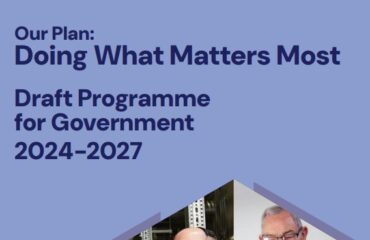The Good Friday/Belfast Agreement and environmental governance: Risks and opportunities after Brexit

The island of Ireland is a single bio-geographic unit, with common geology, landscapes, water catchments, and flora and fauna. Ecosystems are complex, interconnected webs that do not respect political boundaries or borders. In Lough Foyle – an estuary divided by the border between Ireland and Northern Ireland that is also a Ramsar Wetland site – salmon do not know where the jurisdictional boundary is drawn. The maintenance of environmental integrity on the island of Ireland requires a cross-border, co-operative approach between Northern Ireland, Ireland and the UK, founded on common regulatory frameworks, together with effective and even enforcement of those regulatory frameworks.
Key to this future co-operation is the Good Friday/Belfast Agreement (hereinafter “the GF/BA” or “the Agreement”). A relatively unexamined aspect of the Agreement is the emphasis that it placed on environmental issues in general and environmental cross-border co-operation between Northern Ireland and Ireland in particular.
The environment is one of the twelve nominated areas of North-South co-operation in the Agreement. Many of the bodies, discussed below, have explicit environmental remits. In addition, many of the other areas of co-operation environmental aspects (e.g. agriculture and transport).
Brexit threatens environmental cooperation
Brexit represents a threat to coherent environmental governance and the current framework of cross-border co-operation that was fostered by the GF/BA. This is because the shared context of EU membership promoted both regulatory alignment and greater cross-border co-operation.
Some of the main threats posed by Brexit involve:
- Regulatory divergence: Losing the EU’s shared regulatory context creates the potential for less coherent environmental governance/regulation across the island as a whole. Deregulation in response to market pressure is a possibility, leading to lower standards in Northern Ireland and the UK, issues with cross-border pollution and environmental degradation of protected sites.
- Loss of EU supra-national governance structures: EU governance mechanisms, with their agenda of integration and coherence, have played a key role in environmental policy in Northern Ireland, including the regulatory, monitoring and enforcement functions of the European Commission, and the supra-national jurisdiction of the Court of Justice of the European Union (CJEU) in Northern Ireland.
- Loss of funding: EU funding is related both to cross-border co-operation in general (e.g. PEACE funding) and environmental cross-border co-operation in particular (e.g. Interreg funding) and have been a very important driver of cross-border co-operation. The EU has guaranteed the PEACE and Interreg funding streams up until 2020 in the event of a no-deal Brexit. The UK has also committed to replacing these funding streams and those under the CAP.
- Physical and regulatory barriers to cross-border co-operation: A hard border or a customs border would represent a potential physical obstacle to cross-border environmental projects, potentially causing innumerable problems from movement of staff on projects and goods necessary for the carrying out of projects, to the more abstract problems caused by regulatory divergence and governance changes necessitated by Brexit.
Other risks include a potential reduction in the ability to take joint action on prosecution of cross-border environmental crime and a loss of the protections afforded by the EU Charter on Fundamental Rights.
Overall, this means that Brexit presents a challenge for instituting and maintaining cross-border cooperation.
How can the Good Friday/Belfast Agreement help?
Potentially these obstacles could be tackled by making greater use of the GF/BA guarantees, bodies and institutions as a vehicle to maintain policy alignment and regulatory alignment.
The Bill of Rights for Northern Ireland could provide an important replacement for some of the human rights protections lost with the UK’s withdrawal from the EU Charter on Fundamental Rights.
The character of the GF/BA as an instrument of constitutional and human rights law, and its institutionalisation of the ECHR into Northern Ireland and Irish law, could provide a potential avenue of legal redress for individuals should they be adversely affected by lowered standards of environmental protection.
Guaranteeing the current cross-border project funding streams should be a top priority, as should effective environmental enforcement in Northern Ireland and Ireland.
However, perhaps the most significant aspect of the GF/BA for post-Brexit environmental co-operation can be found in the cooperative bodies it creates:
- The North South Ministerial Council (NSMC) is made up of representatives of the Irish and Northern Irish Governments. It should be the primary body for overseeing North-South co-operation, and the environment is one of its nominated areas of work. However, it has been rendered non-operative by the ongoing failure of Executive formation in Northern Ireland.
- The British Irish Council (BIC) is a regional body comprised of representatives of the administrations in Scotland, Wales, Northern Ireland, the UK, Ireland, the Channel Islands and the Isle of Man, designed to foster cooperation and policy alignment between the administrations in the British Isles. It has met on a frequent basis and has an active work program that includes the environment. As such it has immense potential to ensure coherent environmental governance in the British Isles, and has already been used to deal with issues such as invasive species and climate change adaptation that require joint action.
- The British Irish Intergovernmental Conference (BIIC) is a body comprised of representatives of the Irish and UK Governments, which appear to take on increasing importance the longer a political vacuum continues in Northern Ireland. This body has only met very infrequently, with a long gap from 2007 – 2018 between meetings. It does not appear to have its own website, and it is unclear if it has a dedicated secretariat. It was due to meet again in Spring 2019, but this does not appear to have happened. All of this suggests insufficient resources are being dedicated to this body.
- The Consultative Civic Forum for Northern Ireland offers an important safeguard against “race-to-the-bottom” deregulation that may be a danger post-Brexit, offering a chance for a strong NGO/civil society voice in policy making in Northern Ireland. This body was instituted but has not run since 2002. Recent proposals are to reduce the Forum from its original panel of 60 members (divided into Trade Union, Community and Voluntary and Other categories), to a six person panel. There has also been a proposal for a Northern Ireland Citizens Assembly. This however lacks the collegiate structure envisaged in the GF/BA for the Consultative Civic Forum. As a result, neither of these bodies fulfil the role of the Forum originally envisaged in the GF/BA, but properly constituted it could play an important role in post-Brexit policy making.
- The All Island Consultative Forum offers a similar opportunity for civil society engagement on an all-island basis. This could be invaluable in terms of development of coherent environmental policy through dialogue with civil society. This body has never been utilised, but the recently held “All-Island Civic Dialogue on Brexit” offers an important example of how it could be modelled.
Conclusion
Only flexible and innovative solutions can overcome the novel politico-legal problems presented by Brexit on the island of Ireland. The Good Friday/Belfast Agreement created a toolkit for developing such solutions, which has unfortunately been underutilised to date. The bodies and institutions of the Good Friday/Belfast Agreement have never been more important than they are now as potential avenues for solving the innumerable problems posed by Brexit. Every effort should be made to fully exploit these mechanisms in the years to come.
About the author
Alison Hough BL is a Lecturer at the Athlone Institute of Technology in County Westmeath, Ireland. She practiced as a barrister for 8 years and now lectures on environmental law and other subjects. Alison’s research interests and publications primarily lie in enhanced public participation, the Aarhus Convention, and more recently, Brexit.
This blog post presents a summary of the research carried out for the report “Brexit, the Good Friday/Belfast Agreement, and the Environment: Issues arising and possible solutions” carried out for the Environmental Pillar and Northern Ireland Environment Link (NIEL). The executive summary and full report are also available.




